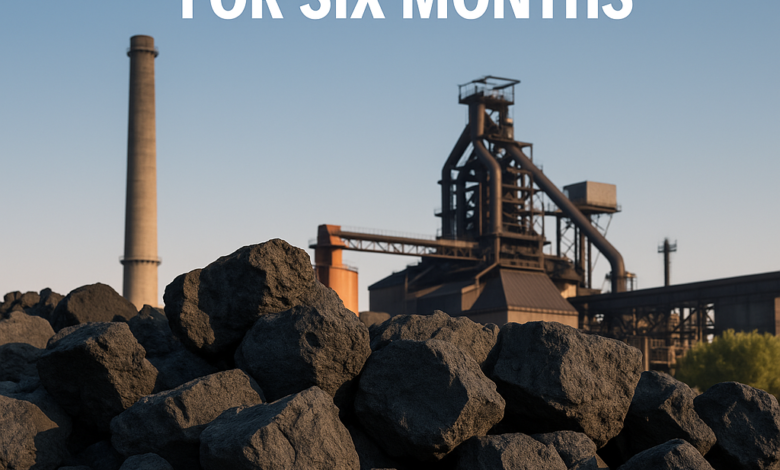India Extends Import Curbs on Met Coke – A Game-Changer for Steel, Trade & Self-Reliance

Introduction: A Strategic Shift in India’s Steel Strategy
On June 30, 2025, the Indian government announced a six-month extension of import restrictions on low-ash metallurgical coke—commonly known as met coke—pushing the limits until December 31, 2025. The restrictions cap imports at 1.4 million tonnes, allocated via country-specific quotas. This strategic move aims to boost domestic production, fortify self-reliance under the “Make in India” drive, and shield local industries from cheap imports. But it’s too soon to declare victory: opposition from major steelmakers like ArcelorMittal Nippon India and JSW Steel signals potential supply constraints and long-term implications for expansion and growth
Why Met Coke Matters in Steel Manufacturing
Metallurgical coke is the backbone of the steel industry. It’s essential for blast-furnace-based steelmaking because of its:
-
High carbon content and low ash levels, which reduce impurities
-
Structural integrity under high temperatures
-
Role as both fuel and reducing agent in iron smelting
Low-ash met coke is particularly valued—it enhances efficiency and reduces environmental load. India’s reliance on it has surged, mainly due to quality concerns with domestically produced coke. Imports have more than doubled in four years, tapping into global markets like China, Japan, and Poland
What the Extension Means: Mechanics of the Policy
As per the Directorate General of Foreign Trade (DGFT) order:
-
A total import cap of 1.4 million metric tons applies from July 1 to December 31, 2025.
-
Country-specific quotas remain unchanged—largest allocations for Poland, Japan, and Colombia
-
A new anti-dumping investigation is underway for shipments from Australia, China, Colombia, Indonesia, Japan, and Russia
-
The combined strategy aims to protect domestic suppliers and enhance local steel value chains.
The policy aligns with domestic production—India has 7 million tonnes of met coke capacity but only ~3 million tonnes in actual output due to demand constraints
Government’s Rationale: Self-Reliance Over Cheap Imports
Commerce Minister Piyush Goyal and the Steel Ministry advocate for this extension, highlighting several reasons:
-
Utilize unused domestic capacity and reduce import dependence
-
Support local manufacturers who struggle to compete with cheaper international supply
-
Encourage Make in India growth with sustainable sourcing practices
This signals a decisive shift away from global supply chains toward national resilience—a theme resonant in India’s broader economic strategy.

Pushback from Steelmakers: Concerns Over Quality and Capacity
Major steel producers have raised pressing concerns:
-
ArcelorMittal Nippon India warned it might shut down blast-furnaces or delay expansion due to insufficient low-ash met coke availability. They’ve requested additional quotas from Poland and Japan
-
JSW Steel echoed quality concerns and has pursued legal relief from new import rules.
-
The Delhi High Court rejected pleas from JSW and Trafigura to clear pending shipments—emphasizing policy intent over commercial interests
Local producers also highlight that despite quotas, imports may bypass restrictions through misclassification—reducing effectiveness
Economic and Trade Implications
The extended restriction carries trade-offs:
-
Domestic Steel Impact
Steel mills reliant on imported coke may face production bottlenecks, slower expansion, or ramping operating costs due to domestic substitutions. -
Trade Tensions
Countries like China and Japan could view this as protectionist. Meanwhile, the ongoing anti-dumping investigations might impact bilateral trade ties -
Price Volatility
With fewer imports, India may face price spikes for met coke, though softened global coal prices offer some respite -
Regulatory Confidence
Public disagreement with industry raises concerns: retroactive quotas and halted imports may deter private investment or disrupt long-term contracts .
Also Read: https://www.reuters.com/world/china/india-extends-import-curbs-met-coke-six-months-2025-06-30/
Long-Term Implications: Will It Succeed?
The policy’s success hinges on several factors:
-
Scaling Domestic Output: The industry must ramp capacity utilization from ~3 million to sustainably meet demand.
-
Quality Uplift: Indian coke makers need to match or surpass imported product reliability and consistency—this needs investment.
-
Pricing Competitiveness: Domestic coke must compete with imports, factoring in freight and logistics.
-
Policy Consistency: Frequent changes and court rulings add uncertainty; credible guarantees and stable regulations are needed.
If achieved, the move could strengthen India’s steel backbone, cut import bills, and support the nation’s strategic push toward industrial self-reliance.
Strategic Recommendations for Stakeholders
For Steelmakers:
-
Collaborate with domestic coke producers to improve quality.
-
Adjust inventory planning and secure advance allocations under quotas.
-
Monitor judicial and policy developments closely.
For Domestic Coke Producers:
-
Invest in capacity expansion and quality improvement.
-
Gain certifications and develop global benchmarks.
-
Engage policymakers in ensuring fair quota allocations.
For Policymakers & Regulators:
-
Maintain transparent quota systems and implement anti-dumping controls.
-
Provide fiscal incentives—like subsidies or tax breaks—for domestic coke modernization.
-
Coordinate between ministries to align import policy and industrial strategy.
For Investors & Trade Analysts:
-
Watch growth trajectories in steel and related infrastructure.
-
Monitor global trade relations as context for future policy.
-
Track anti-dumping outcomes—these can reshape future sourcing norms.
Looking Ahead: December 2025 and Beyond
As the extension period concludes, India faces a crucial moment:
-
Did domestic supply improve enough to meet demand?
-
Will there be another extension of import curbs?
-
Could export markets respond or challenge via trade disputes?
-
Will domestic coke emerge as a reliable global competitor?
Answers will emerge as data on domestic output, pricing, and international trade flows becomes available.
Conclusion: Striking a Strategic Balance
India’s extension of low-ash met coke import curbs is more than a trade tweak—it’s a declaration of intent. By prioritizing domestic sourcing, the country is betting on industrial self-reliance and support for local manufacturing. But risks persist: production disruptions, investor caution, and international pushback may result.
To truly succeed, this initiative needs synchronized improvements—in coke quality, regulatory stability, and industry cooperation. If thatworks, India could reshape its steel ecosystem from being import-reliant to globally competitive, resilient, and future-ready. Keep Reading at Manapaisa.
